����̨ٳ����ҽԺ�ĵ绰����-������̨ٳ����ҽԺ��������̨ٳ����ҽԺ,����������ʮ�����̥����Ǯ,�������������ǼҺ�,��������̥����Ҫ�ö���Ǯ,����˽������ҽԺ�ļҺ�һ��,������������ȥ�ĺ�,�������ļ�ҽԺ�������ýϺ�
��������̨ٳ����ҽԺ�ĵ绰������������ʹ��̥���ö���Ǯ,�����������ĸ�ҽԺ��,������ʹ�����ĸ�ҽԺ��,����������ȽϺ�������,����������ҽԺ�ĸ��Ϻ�,�������д�̥���ö���,����������������ʹ����
���� ����
����Federal prosecutors announced Wednesday that they have struck a non-prosecution agreement with National Enquirer parent company American Media Inc., effectively ruling out charges for the tabloid publisher over its role in securing hush money from President Trump's longtime personal lawyer Michael Cohen.As part of the agreement, AMI admitted to making a payment of 0,000 in cooperation with members of Trump's presidential campaign in order to prevent former Playboy model Karen McDougal's claims of an affair with Trump from being made public during the 2016 race.AMI chairman David Pecker is a longtime friend of Trump's, and the Enquirer was one of Trump's most reliable and enthusiastic media boosters during the campaign.Pecker met with Cohen "and at least one other member of the campaign" in August of 2015, according to the non-prosecution agreement, which was struck with prosecutors from the office of the U.S. Attorney for the Southern District of New York."At the meeting, Pecker offered to help deal with negative stories about that presidential candidate's relationships with women by, among other things, assisting the campaign in identifying such stories so they could be purchased and their publication avoided," the agreement read. "Pecker agreed to keep Cohen apprised of any such negative stories."Details of the payment to McDougal emerged in 2016, mere days before the election, when the Wall Street Journal reported about her agreement with the Enquirer. At the time, AMI insisted that it "has not paid people to kill damaging stories about Mr. Trump." The reported agreement drew wider attention earlier this year following a story published by The New Yorker, which shed light on the tabloid practice of "catch and kill," wherein a publication purchases a story purely so it won't run. McDougal signed a contract worth 0,000, granting AMI "exclusive ownership of her account of any romantic, personal, or physical relationship she has ever had with any 'then-married man,'" the New Yorker reported.The news of the non-prosecution agreement comes the same day that Cohen was sentenced to three years in prison for his role in the matter.In a statement, the SDNY said, "Assuming AMI's continued compliance with the agreement, the Office has agreed not to prosecute AMI for its role in that payment."A spokesperson for AMI declined to comment. 2421
����Ever wonder what happens to disposable contact lenses when it's time to actually dispose of them?Some scientists at Arizona State University asked that question and found that a lot of them are going down the sink or getting flushed down the toilet -- adding to the problem of microplastic pollution.Microplastics are bits of plastic that have been worn down into tiny pieces that are smaller than 5 millimeters. They can be harmful to wildlife.The researchers started by conducting an anonymous online survey 400 people who do or don't wear contact lenses. 566
���� ����
����Employers may refuse to hire someone whose hair is in dreadlocks, a court of appeals has decided.The Equal Employment Opportunity Commission filed the civil rights suit against Catastrophe Management Services after it told a woman it would not bring her on board with dreadlocks and terminated a job offer.Reports indicate a human resources manager with the company told the candidate during a hiring meeting dreadlocks "tend to get messy." The EEOC?claimed it was a violation of the Civil Rights Act of 1964's Title VII, arguing dreadlocks are a "racial characteristic," according to NBC News.The 11th U.S. Circuit Court of Appeals ruled that the company in this lawsuit has a "race-neutral grooming policy" and was not discriminatory, and dreadlocks are not a cultural practice, NBC News reported. 817
����ESCONDIDO, Calif. (KGTV) �� California Gov. Gavin Newsom says the state is activating the federal medical station at Palomar Medical Center in Escondido, while ICU bed capacity is strained in several regions.It wasn't immediately clear when the medical station could begin accepting patients."We are bringing a fifth alternative care site out of warm status, we're standing up that site, an FMS site, down in San Diego," Newsom said during an online press conference on Wednesday.RELATED: Hospital staffing concerns as COVID-19 hospitalizations increase in San Diego CountyPalomar Health preparing for increase in San Diego County COVID-19 hospitalizations as cases surge in CaliforniaDuring a Wednesday press conference, Chris Van Gorder, CEO of Scripps Health, said that San Diego County is not all that far from running short of ICU beds and staffing is a significant issue."The reality is, we're facing a significant situation here with our capacity and it's made worse because back in the summer, the spring and summer, it was a regional situation and not a national situation. So back then, we could get traveling nurses, we could get registry nurses, we could hire more nurses locally," Van Gorder said. "Today, this is a national situation and we cannot recruit travelers, we cannot recruit registry nurses, and unfortunately, a number of our healthcare providers are also getting sick."Van Gorder said the county has 24 staffed ICU beds left, out of about 670 available. He added that as hospitals get full and resources are strained, the type of care for anyone needing hospital care will change to crisis care.The top two floors of the Escondido hospital have been set up to serve as an FMS site. The site includes 202 beds that can be used for patients that don't require ICU care. The site could take in patients from other county hospitals that become overwhelmed, Dr. Omar Khawaja, the Chief Medical Officer for Palomar Health, told ABC 10News a few weeks ago."It could be beds that we would offload some of the less sick patients from other systems into there so they can handle the sicker patients; we don��t have a solid plan for it yet," he said.California's cumulative ICU bed capacity hit 1.1% on Wednesday, with the Southern California region at 0%. Three other regions were also under the state's regional stay-at-home orders activated after a region dips under 15% ICU capacity.San Diego County reported 348 coronavirus ICU cases on Wednesday and an additional 2,598 COVID-19 cases.Van Gorder said the county and hospitals project that hospitalizations will continue to grow and peak on Jan. 10, 2021, with about 1,827 patients, and ICU cases will peak on Jan. 11, with about 483 patients."Today, the governor announced the federal medical station at Palomar Medical Center is going to be activated. It's a developing situation. We'll share more information as we get it. But we're doing everything that we can to address the impact of the transmission of COVID, but each and every one of us now need to do everything we can to impact the situation our hospitals face," county Supervisor Nathan Fletcher said during Wednesday's press conference. 3175
����Europe is proposing a ban on single-use plastic items such as cutlery, straws?and cotton buds in a bid to clean up the oceans.The European Commission wants to ban 10 items that make up 70% of all litter in EU waters and on beaches. The list also includes plastic plates and drink stirrers.The draft rules were unveiled Monday but need the approval of all EU member states and the European Parliament. It could take three or four years for the rules to come into force.The legislation is not just about banning plastic products. It also wants to make plastic producers bear the cost of waste management and cleanup efforts, and it proposes that EU states must collect 90% of single-use plastic bottles by 2025 through new recycling programs.The European Commission estimates that these rules, once fully implemented in 2030, could cost businesses over �3 billion (.5 billion) per year. But they could also save consumers about �6.5 billion (.6 billion) per year, create 30,000 jobs, and avoid �22 billion (.6 billion) in environmental damage and cleanup costs.The Rethink Plastic Alliance -- an association of environmental organizations -- called the proposals "a leap forward in tackling plastic pollution" but criticized some perceived shortcomings.The proposals do not set targets for EU countries to reduce the use of plastic cups and food containers, it said."This could result in countries claiming they are taking the necessary steps as long as any reduction is achieved, regardless of how small," the alliance said in a statement.The proposal also faced criticism from the plastics industry.Plastics Europe, which represents manufacturers, said it supported the "overarching objective" of the proposal but said there must be more resources dedicated to "waste management" to ensure better collection of used plastic."Plastic product bans are not the solution," it said in a statement, and noted that "alternative products may not be more sustainable."On a global basis, only 14% of plastic is collected for recycling. The reuse rate is terrible compared to other materials -- 58% of paper and up to 90% of iron and steel gets recycled.Research shows there will be more plastic than fish by weight in the world's oceans by 2050, which has spurred policy makers, individuals and companies into action.Last month a group of more than 40 companies including Coca-Cola, Nestle, Unilever and Procter & Gamble pledged to slash the?amount of plasticthey use and throw away in the United Kingdom.Starbucks also announced in March it was launching a million grant challenge to solicit designs for a cup that's easier to recycle. 2689


